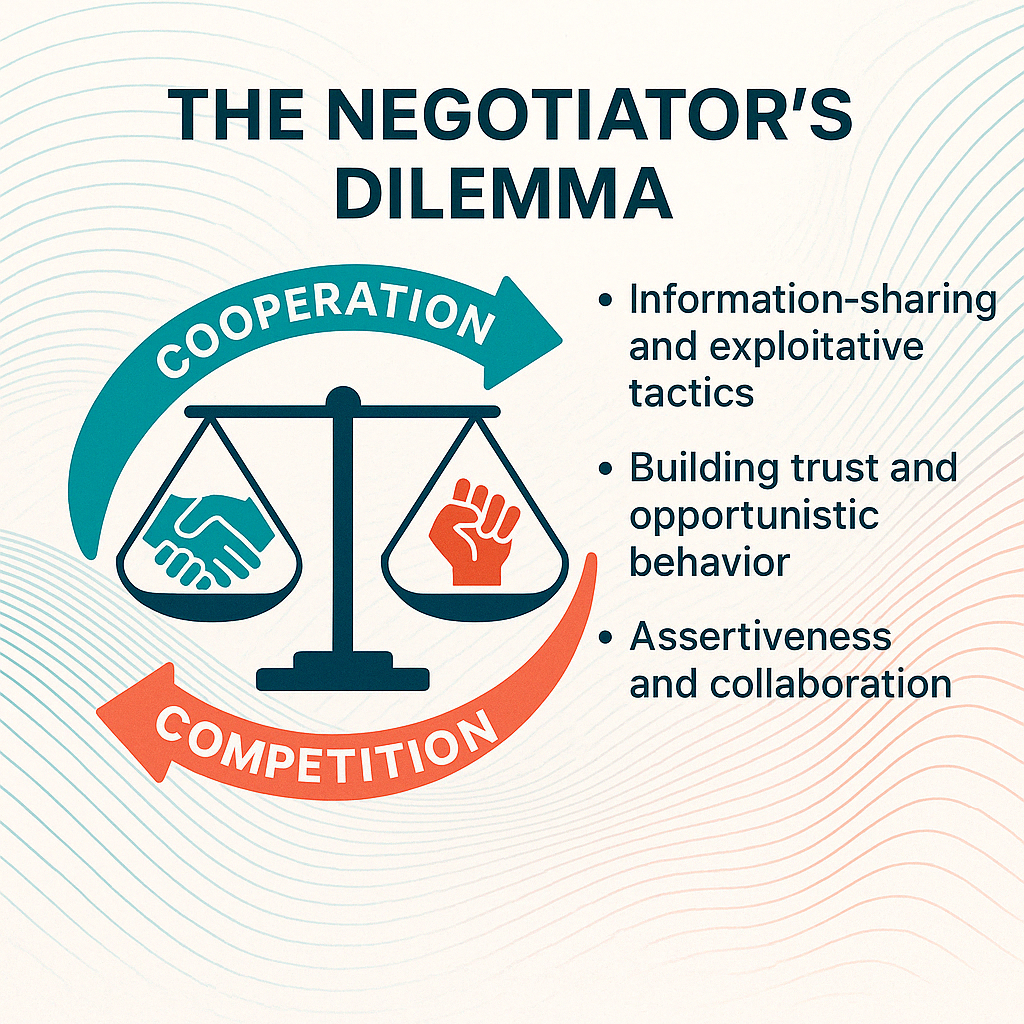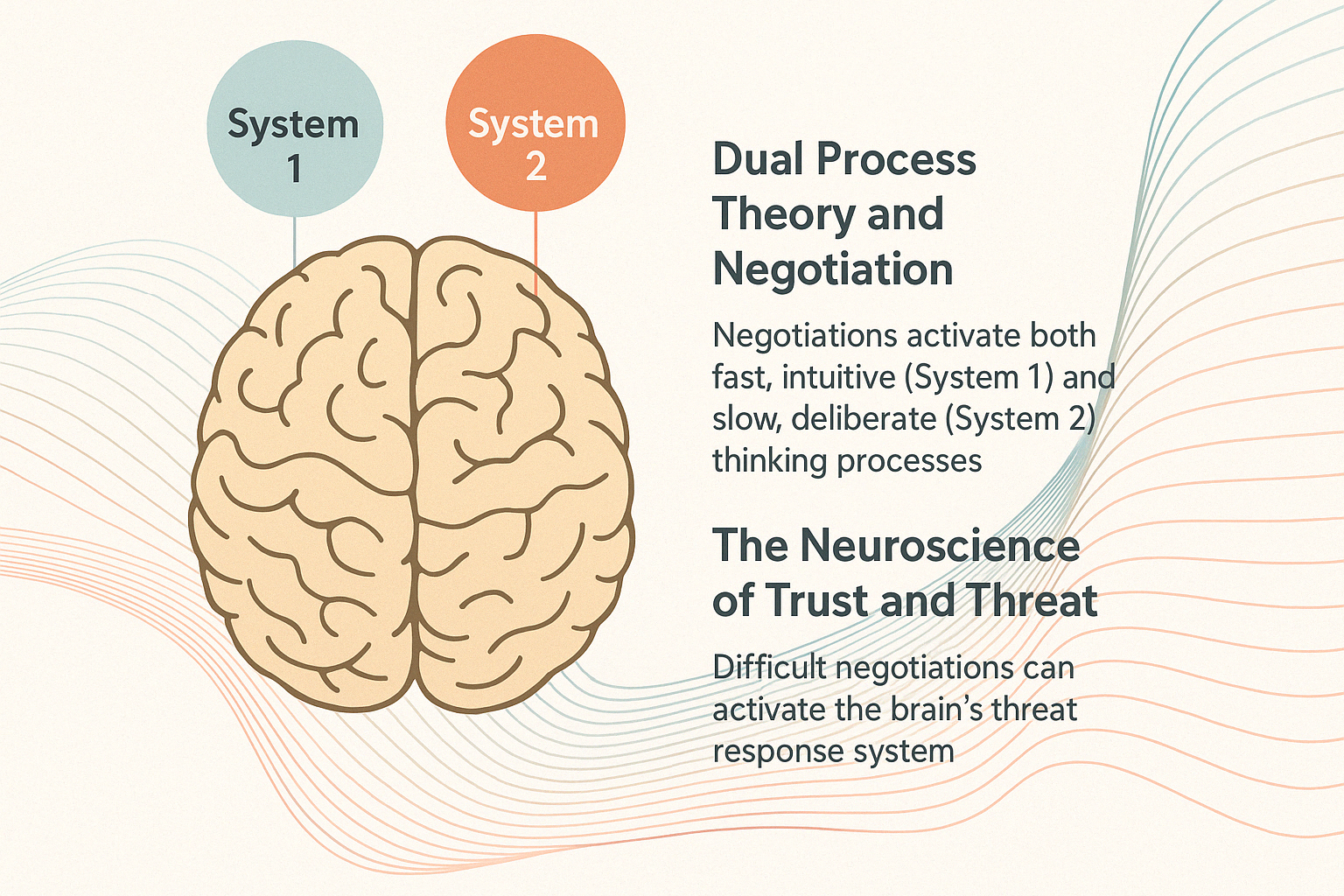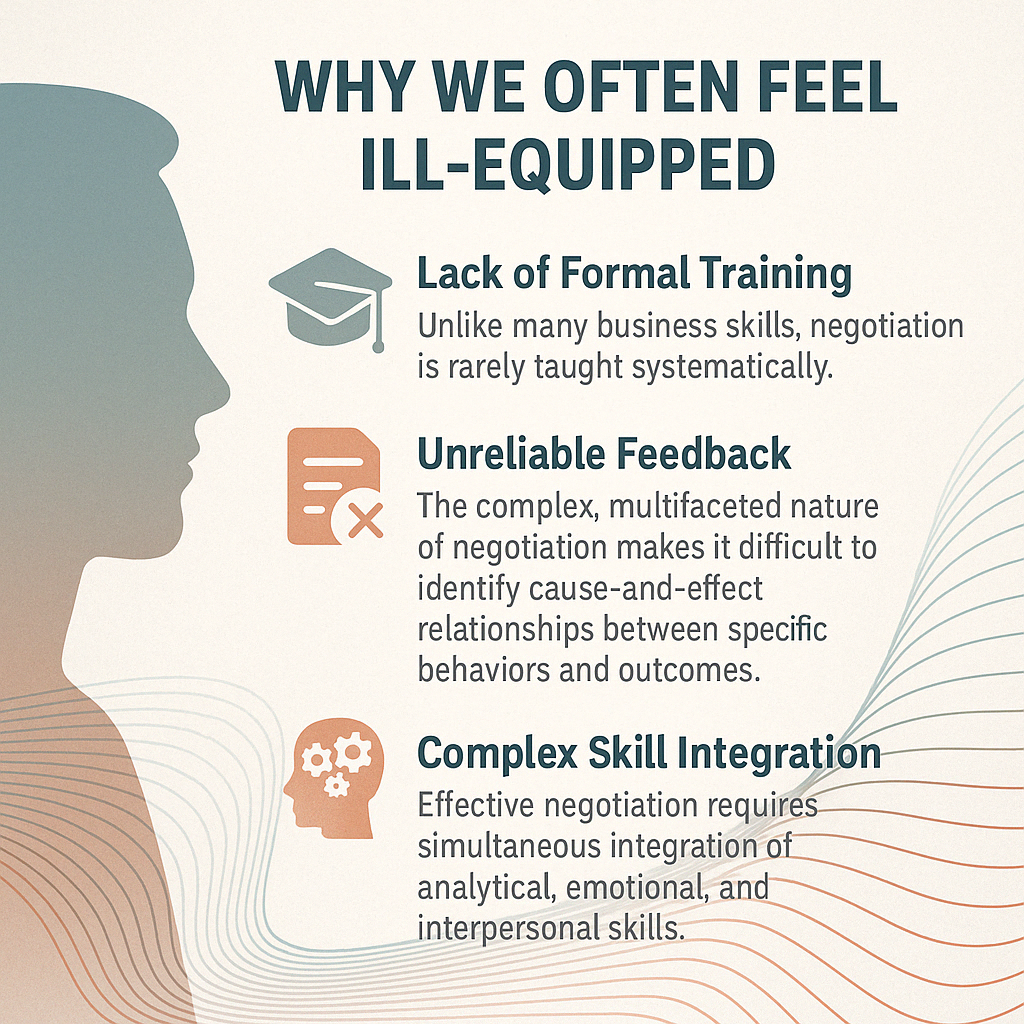Why Negotiation Is Difficult: The Science Behind Our Struggles at the Bargaining Table

Negotiation, a fundamental aspect of professional and personal interaction, remains a challenging endeavor for many individuals despite its ubiquity in daily life. We’ve synthesize insights from psychology, neuroscience, and negotiation theory to understand why this critical skill often feels so difficult to master.
This article explores the multifaceted nature of negotiation difficulty, providing evidence-based insights into the psychological, emotional, and strategic complexities that make negotiation challenging—and offers perspective on how these challenges can be systematically addressed.
The Intuition Gap: Why Natural Instincts Fall Short
Despite negotiation’s commonality in human interaction, success in this domain rarely comes naturally. Research consistently demonstrates that negotiation effectiveness requires more than intuition alone. The Harvard Negotiation Project has documented that reliance on intuitive approaches in high-stakes bargaining situations frequently leads to suboptimal outcomes for all parties involved (Fisher & Ury, 2011).
This “intuition gap” occurs because effective negotiation requires a structured methodology that most individuals have never formally acquired. As Shell (2006) notes, many professionals operate with significant skill set incompetencies in negotiation contexts, having never received formal training or engaged in conscious practice of negotiation techniques.
This is further complicated by what researchers have termed the “negotiator’s dilemma”—the fundamental tension between creating value through cooperation and claiming value through competition (Lax & Sebenius, 2006). Without a structured framework for managing this tension, negotiators often default to simplistic, one-size-fits-all approaches that rarely succeed in complex bargaining situations.
The Psychological Complexity of Negotiation
Cognitive Biases and Perceptual Limitations
Negotiation difficulty extends beyond skill deficiency into the realm of cognitive psychology. Multiple studies have identified systematic biases that influence negotiator behavior:
Confirmation Bias
Negotiators demonstrate strong tendencies to seek out and overvalue information that supports their existing positions while devaluing opposing viewpoints (Kahneman, 2011). This “selective perception” creates significant barriers to finding integrative agreements.
Fixed-Pie Assumption
Research by Bazerman and Neale (2021) shows that negotiators frequently assume negotiations are zero-sum games where one party’s gain must come at another’s expense, limiting exploration of mutually beneficial options.
Egocentrism
Studies consistently reveal that negotiators tend to overestimate their abilities and the fairness of their positions (Thompson, 2015). This overconfidence often leads to inadequate preparation and unrealistic expectations.
Emotional Barriers to Effective Negotiation
The emotional dimension of negotiation creates another layer of challenge. Research from multiple disciplines highlights how emotions significantly impact negotiation processes and outcomes:
Anxiety and Physiological Stress
Studies utilizing physiological measurements during negotiation simulations demonstrate that many individuals experience significant anxiety during negotiations, manifested through increased heart rate, sweating, and other stress responses (Brooks & Schweitzer, 2011). This anxiety not only creates discomfort but can substantially impair cognitive performance.
Emotional Reactivity
Research by Van Kleef et al. (2010) reveals that negotiations frequently trigger strong emotional responses, particularly anger and frustration. These emotional reactions can lead to more aggressive behavior, rejection of otherwise acceptable offers, and reduced information-sharing.
Emotional Intelligence Demands
Successful negotiation requires high levels of emotional intelligence—the ability to recognize and manage one’s emotions while accurately perceiving and appropriately responding to others’ emotional states (Shapiro, 2017). This complex skill set presents a significant challenge for many negotiators.
The Strategic Complexities of Negotiation
Beyond psychological factors, negotiation’s inherent strategic complexity poses distinct challenges.

The Negotiator’s Dilemma
A fundamental strategic tension exists between creating value through cooperation and claiming value through competition (Lax & Sebenius, 2006). This tension creates several practical difficulties:
Information-sharing is essential for discovering joint interests and creating value, yet openly sharing information makes negotiators vulnerable to exploitative tactics.
Building trust enhances collaboration but potentially increases vulnerability if the other party behaves opportunistically.
Balancing assertiveness with collaboration requires sophisticated judgment that develops primarily through experience and guided practice.
Process Management Complexity
Negotiators must simultaneously manage both substance (what is being negotiated) and process (how the negotiation unfolds). This dual management responsibility creates significant cognitive load, particularly in complex negotiations involving multiple issues and stakeholders (Watkins, 2002).
The Neurological Basis of Negotiation Challenges
Advances in neuroscience have provided valuable insights into the neurological underpinnings of negotiation difficulty:
Dual Process Theory and Negotiation
Nobel laureate Daniel Kahneman’s research on dual process theory helps explain why negotiation feels difficult. Negotiations activate both fast, intuitive (System 1) and slow, deliberate (System 2) thinking processes:
High-pressure negotiation situations often trigger System 1 responses, leading to emotionally-driven decisions rather than analytical reasoning (Kahneman, 2011).
Effective negotiation frequently requires engaging System 2 thinking to overcome biases, analyze complex information, and develop creative solutions—a cognitively demanding task requiring significant mental energy.
The Neuroscience of Trust and Threat
Neuroscience research reveals that difficult negotiations can activate the brain’s threat response system:
When negotiators perceive threats to their interests or status, the brain’s amygdala activates, potentially triggering fight-or-flight responses that override rational decision-making (Leathes, 2017).
Creating psychological safety—a key factor in successful negotiation—requires specific conversational techniques that reduce threat activation while increasing activity in brain regions associated with analytical reasoning and empathy.

The Neurological Basis of Negotiation Challenges
Advances in neuroscience have provided valuable insights into the neurological underpinnings of negotiation difficulty:

Lack of Formal Training
Unlike many business skills, negotiation is rarely taught systematically, leaving professionals without structured knowledge or practiced techniques.
Unreliable Feedback
The complex, multifaceted nature of negotiation makes it difficult to identify cause-and-effect relationships between specific behaviors and outcomes, hindering natural learning processes.
Complex Skill Integration
Effective negotiation requires simultaneous integration of analytical, emotional, and interpersonal skills—a demanding cognitive task that improves primarily through deliberate practice and coaching.
Addressing the Challenge: The Path Forward
Understanding the complex factors that make negotiation difficult provides insight into how these challenges can be systematically addressed:

Evidence-Based Methodology
Effective negotiation training must be grounded in evidence-based methodologies that integrate insights from multiple disciplines, including psychology, neuroscience, and negotiation theory. This integrated approach ensures that training addresses both the analytical and emotional dimensions of negotiation effectiveness.
Rather than relying on limited perspective or isolated experience, comprehensive research foundations like StrideRock Synapse enable the identification of patterns, validation of approaches, and development of integrated methodologies that reflect the most current and credible thinking in the field. This commitment to research integrity delivers solutions that combine academic rigor with practical effectiveness.
Structured Skill Development
Developing negotiation proficiency requires a structured approach to skill development that includes:
Psychological Dynamics
Understanding the psychological dynamics of negotiation
Managing Emotions
Learning specific techniques for managing emotions and cognitive biases
Systematic Framework
Developing a systematic framework for preparation and strategic planning
Cognitive Engagement
Practicing specific conversational techniques that enhance cognitive engagement and psychological safety
Ongoing Practice and Reinforcement
Like any complex skill, negotiation proficiency develops through deliberate practice and ongoing reinforcement. Organizations seeking to enhance negotiation effectiveness must invest in sustained capability development rather than one-time training events.

The difficulty many experience with negotiation stems from its complex interplay of psychological, emotional, and strategic factors. By understanding these challenges through the lens of evidence-based research, organizations and individuals can develop more effective approaches to building negotiation capability.
At StrideRock Strategic Consulting, our ADAPT™ program addresses these challenges through a comprehensive methodology developed and continuously refined through StrideRock Synapse, our proprietary research and development platform. Unlike approaches based solely on personal experience or limited research, ADAPT™ integrates insights from neuroscience, behavioral economics, and negotiation theory to provide structured frameworks for navigating the psychological and strategic complexities of negotiation. This evidence-based methodology enables organizations to translate negotiation capability into measurable business results through approaches that are both academically sound and practically effective.
References ↓
Hover to Expand




